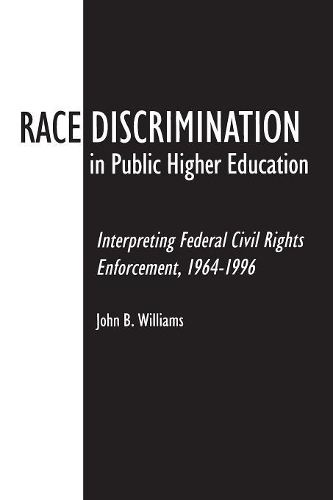
Race Discrimination in Public Higher Education: Interpreting Federal Civil Rights Enforcement, 1964-1996
(Paperback)
Available Formats
Publishing Details
Race Discrimination in Public Higher Education: Interpreting Federal Civil Rights Enforcement, 1964-1996
By (Author) John B. Williams
Bloomsbury Publishing PLC
Praeger Publishers Inc
26th August 1997
United States
Classifications
Tertiary Education
Non Fiction
Educational administration and organization
Ethnic groups and multicultural studies
Social and ethical issues
Higher education, tertiary education
Social and cultural history
379.26
Physical Properties
Paperback
216
Description
After years of widely acknowledging race discrimination in higher education, American government leaders, college and university officials, and at-large citizens today question the need for civil rights laws and policies. Within an important sector of the public higher education community roughly nineteen states that used to operate laws separating students by race dispute focuses upon systemwide Title VI enforcement. Two interpretations of Title VI enforcement coexist. Among conservatives, absence of continuing discrimination and continuing good faith effort signal an end to the need for government enforcement. Among more liberal stakeholders, past enforcement has been weakly undertaken despite past and currently increasing evidence of continued discrimination. Closely reviewing evidence of past and current enforcement, Williams presents a reinterpretation: Considerable evidence of continued discrimination exists, but weak design and limited implementation provides an incomplete picture of past and current enforcement. Weak federal enforcement establishes a context for previously unrecognized unofficial state responses, and unofficial responses display important elements of a generic race relations ritual first chronicled in largely forgotten humanities and sociological literature from the 1960s. An important study for scholars, students, researchers, and policymakers of contemporary American education and race relations.
Author Bio
JOHN B. WILLIAMS is Professor of Education at the University of Alabama-Birmingham. He previously taught at Vanderbilt and Harvard. During several years at Harvard, he also served as Assistant to the President, as Assistant Dean of the Graduate School of Education, and as Interim Faculty Chairperson of the Urban Superintendents Program. For several years he served as founding director of an urban public school district-university collaborative, organizing and conducting community-based training programs aimed at improving schooling in New Jersey cities. He also has held a variety of positions in New Jersey state and federal government.
